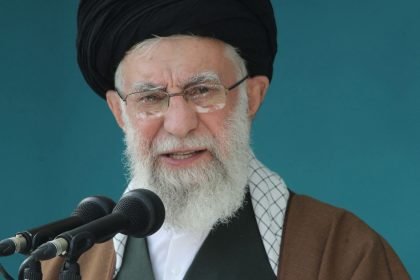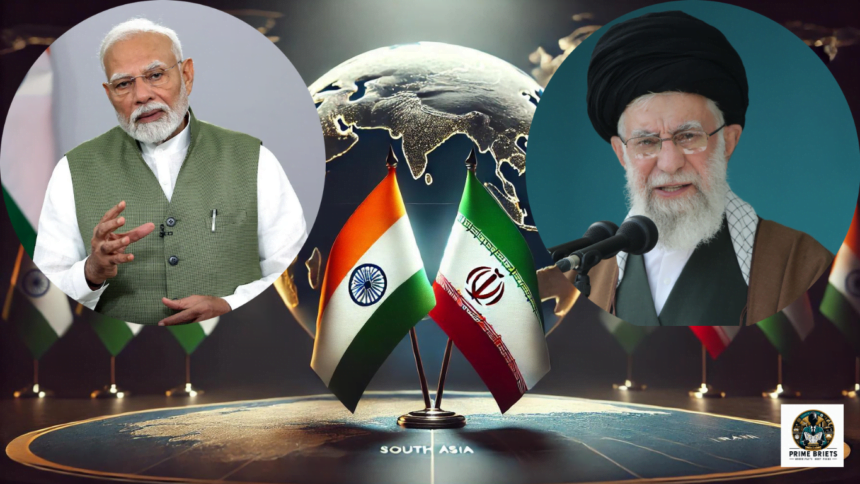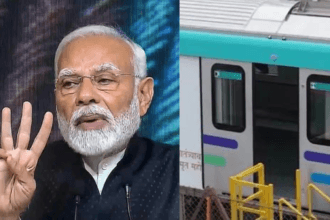Introduction:
Iran’s Supreme Leader, Ayatollah Ali Khamenei, has sparked diplomatic tensions with his recent remarks on the treatment of Muslims and other minorities in India. Delivered on the occasion of Prophet Mohammed’s birth anniversary, Khamenei’s comments highlighted the “suffering” of Muslims not only in India but also in regions like Gaza and Myanmar. India’s Ministry of External Affairs (MEA) swiftly condemned these remarks, describing them as “misinformed and unacceptable,” and called on Iran to focus on its own human rights record before making judgments about other countries. This incident has not only brought attention to the complex dynamics of India-Iran relations but also underscores the broader global discourse on human rights and minority treatment.
Khamenei’s Statement on the Situation of Minorities in India:
Khamenei’s remarks were part of a broader message addressing the challenges faced by Muslim communities around the world. He used the occasion of Prophet Mohammed’s birth anniversary to draw attention to what he perceives as the “suffering” of Muslims in various parts of the globe, including India. On the social media platform X (formerly Twitter), he stated, “We cannot consider ourselves to be Muslims if we are oblivious to the suffering that a Muslim is enduring in #Myanmar, #Gaza, #India, or any other place.” This statement was part of his ongoing narrative that calls for Muslim unity and vigilance against perceived injustices faced by Muslims worldwide.
In referencing India, Khamenei touched upon a sensitive issue, as India has been under international scrutiny for its treatment of minorities, particularly Muslims, in recent years. Policies such as the Citizenship Amendment Act (CAA) and incidents of communal violence have drawn global attention, leading to debates about the state of religious freedom and minority rights in the country. Khamenei’s comments, however, were not just an isolated critique but rather a continuation of Iran’s foreign policy approach, which often involves addressing the plight of Muslims globally.

India's Strong Rebuttal:
India’s Ministry of External Affairs (MEA) was quick to respond to Khamenei’s remarks, labeling them as “misinformed and unacceptable.” The MEA’s statement strongly rejected the depiction of India’s treatment of minorities, emphasizing the country’s commitment to its secular constitution and the protection of all citizens, regardless of religion. The official statement read, “We strongly deplore the comments made regarding minorities in India by the Supreme Leader of Iran.” The MEA further advised countries criticizing India’s handling of minority issues to examine their own human rights records before casting judgment.
India’s response reflects its stance on external interference in what it considers internal matters. The Indian government has consistently maintained that issues related to religious freedom and minority rights are to be managed within the framework of its democratic and constitutional processes. India’s message to Iran was clear: before commenting on the situation in other countries, focus on addressing domestic challenges.

Context of Khamenei’s Remarks Amidst Iran's Domestic Challenges:
Khamenei’s remarks on India’s minority situation came at a time when Iran was facing significant domestic challenges concerning human rights. Notably, his comments coincided with the second anniversary of Mahsa Amini’s death. Amini, a 22-year-old woman, died on September 16, 2022, in a hospital after being detained by Iran’s morality police for allegedly violating the country’s strict dress code. Her death sparked widespread protests across Iran, particularly focusing on women’s rights and individual freedoms. On the day Khamenei made his comments, thousands of Iranian women protested by appearing in public without the mandatory hijab, defying Iran’s strict dress laws.
This context adds a layer of complexity to Khamenei’s remarks. Critics argue that Iran, which has faced international condemnation for its own human rights record, particularly concerning women’s rights, should prioritize addressing its internal issues. Khamenei’s emphasis on the plight of Muslims abroad, including in India, could be viewed as a strategic move to shift the focus away from Iran’s domestic unrest and ongoing challenges related to personal freedoms and human rights.
India-Iran Bilateral Relations: Navigating a Diplomatic Tightrope:
India and Iran have historically maintained strong bilateral relations, marked by cooperation in trade, energy, and strategic regional interests. India’s involvement in the development of Iran’s Chabahar Port is a key element of this partnership, serving as a strategic counterbalance to China’s influence in the region and providing India with direct access to Central Asia. Despite this cooperation, the relationship has had its complexities, often influenced by broader geopolitical dynamics, including U.S. sanctions on Iran and differing stances on regional issues.
High-level diplomatic engagements have continued between the two countries, with recent visits by Indian officials to Iran. In May 2024, India’s Vice-President Jagdeep Dhankar visited Iran to participate in an official ceremony, underscoring the importance of diplomatic ties between the two nations. Additionally, Indian Union Minister Nitin Gadkari attended the swearing-in ceremony of Iran’s new President, Masoud Pezeshkian, in July 2024.
Khamenei’s remarks introduce a delicate issue into this dynamic. While the comments have the potential to strain relations, the long-standing partnership between India and Iran might allow for diplomatic navigation through this situation. However, it does bring to the forefront the challenges that arise when domestic issues are thrust into the international arena by way of public statements from national leaders.
Broader Implications for International Discourse on Human Rights:
Khamenei’s remarks and India’s response highlight a recurring theme in international relations: the tension between domestic policies and global perceptions of human rights. Nations often find themselves in positions where they must respond to external criticisms of their internal affairs, particularly regarding the treatment of minorities and adherence to human rights standards.
For India, the defense against Khamenei’s criticism is consistent with its broader stance on minority issues. Indian officials stress the nation’s secular and democratic principles, emphasizing constitutional protections and the legal framework designed to safeguard the rights of all citizens. India’s diverse social fabric, with its multitude of religions, languages, and cultures, is often cited as a testament to its commitment to pluralism.
For Iran, Khamenei’s comments align with a long-standing foreign policy narrative that champions the cause of Muslim communities worldwide. By invoking the suffering of Muslims in India, Gaza, and Myanmar, Khamenei positions Iran as a defender of Islamic solidarity. However, this approach is frequently met with skepticism, especially when juxtaposed against Iran’s own human rights record. Observers argue that while Iran raises concerns about minority treatment in other countries, it must also address the international community’s concerns about its domestic policies, including issues related to freedom of expression, women’s rights, and political dissent.
Conclusion:
Ayatollah Khamenei’s remarks on the situation of minorities in India have ignited a diplomatic controversy, prompting a strong rebuttal from India’s Ministry of External Affairs. This episode underscores the complexities of international relations, where domestic policies and global perceptions often intersect, leading to tensions between national sovereignty and international human rights advocacy.
As India and Iran navigate this diplomatic challenge, the incident serves as a microcosm of the broader debates surrounding human rights, religious freedom, and the role of nations in addressing or critiquing the internal affairs of others. While the two nations have historically managed to maintain a cooperative relationship despite such challenges, this situation highlights the ongoing need for diplomatic engagement and nuanced dialogue in addressing the multifaceted issues of minority treatment and human rights on the global stage.









